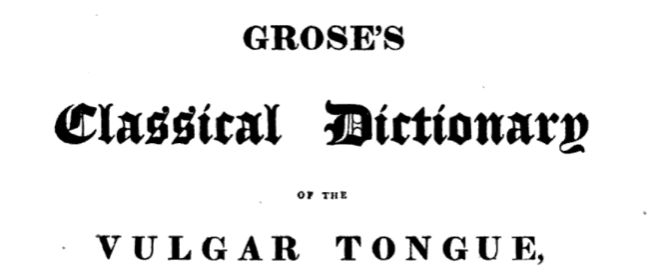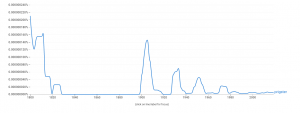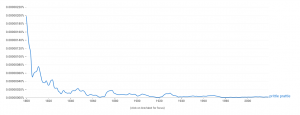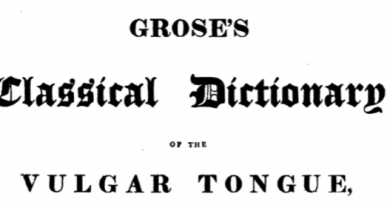Dictionary of the Vulgar Tongue – Day 263, 264 and 265
The Dictionary of the Vulgar Tongue was first published at the end of the eighteenth century, and given that the current health crisis is giving too much time to read books, I thought I’d pick a daily word from it until I got bored…. And to catch up after getting behind with these posts, and because I’m getting towards the end of the book, I’m doing three days at once now. How lovely….
Prigstar
This feels like a more modern word, defined by Grose as “a rival in love”. The word is from the seventeenth century and the word ‘prig’ at the time could mean a cheat, with ‘ster’ just being a suffix used in forming nouns. As an aside, the ‘ster’ used to be the suffix given to a job that a woman did, such as a ‘brewster’ for a female brewer and a ‘baxter’ for a female baker.
Although Grose used the ‘prigstar’ spelling, it was more commonly ‘prigster’. It’s not rarely used and has become archaic.
Prittle Prattle
There’s perhaps a hint at the sexism shown at society at the time with this phrase being defined as “insignificant talk: generally applied to women and children”. The phrase was first recorded as being used in the middle of the sixteenth century and is just a linguistic extension of the word ‘prattle’, meaning to talk in an inconsequential manner.
Unlike the not dissimilar ‘tittle-tattle’, this phrase has now fallen entirely out of usage.
Puff or Puffer
This is defined by Grose as “one who bids at auctions, not with an intent to buy, but only to raise the price of the lot; for which purpose many are hired by the proprietor of the goods on sale“. Now probably more commonly referred to as shill bidding, the word origin is just puffing or pumping up the price.
In 1965, Nicholas Ridley said in the House of Commons in a debate on the registration of auctioneers:
“Lastly, I believe that we should have a rule that when a lot does not reach its reserve no commission is chargeable. This would help to encourage people to put a proper reserve on their goods and to encourage auctioneers to get a proper price for what they are selling. I think that this is know in ancient parlance as “puff-bidding”, whereby a lot is withdrawn before it reaches its reserve. As far as I understand it, some auctioneers charge if goods are knocked down below the reserve price and others do not. I suggest that it should be made one of the rules of the trade that no charge is made where goods do not reach the reserve price.”





